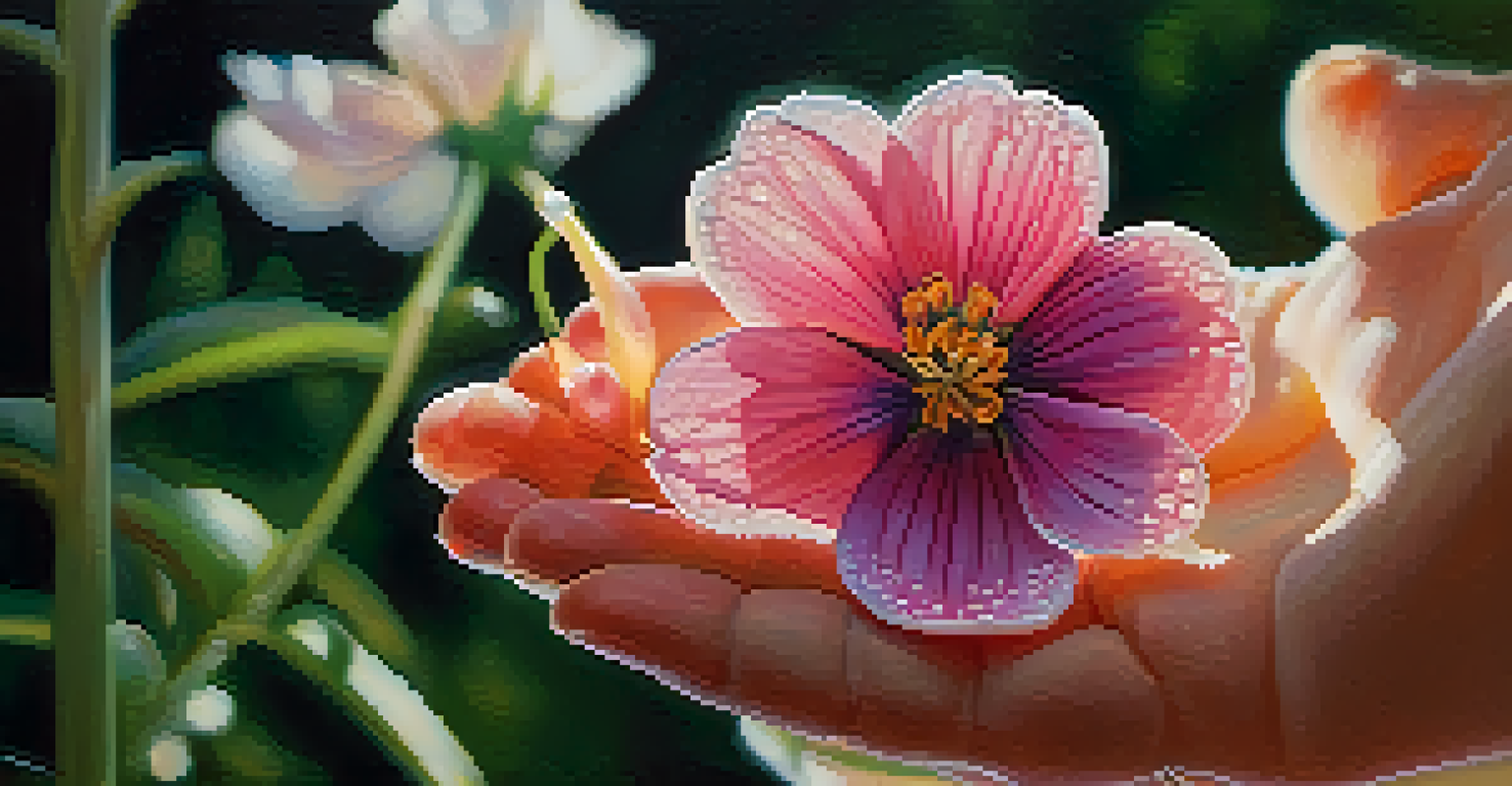Psychedelics and Their Role in Healing Grief and Loss

Understanding Grief: A Natural Response to Loss
Grief is a complex emotional experience that everyone encounters at some point, often triggered by loss. It manifests in various forms, from sadness and anger to confusion and numbness, and can deeply affect our daily lives. Understanding this emotional rollercoaster is crucial as it helps to acknowledge that these feelings are normal and valid.
Grief is not a sign of weakness, nor a lack of faith. It is the price of love.
The journey through grief is unique for each individual; there’s no right or wrong way to grieve. Some might find comfort in talking about their feelings, while others may prefer solitude. Recognizing these differences can help create a supportive environment for those in mourning, allowing them to express their emotions without judgment.
As we explore the role of psychedelics in healing, it's important to remember that they do not serve as a cure-all. Instead, they offer potential pathways to help individuals confront and process their grief, facilitating a deeper understanding of their emotional landscape.
What Are Psychedelics? A Brief Overview
Psychedelics are substances that alter perception, mood, and various cognitive processes. Common examples include psilocybin (found in magic mushrooms) and LSD, both of which have garnered attention for their therapeutic potential. These substances can lead to profound experiences that some users describe as life-changing or enlightening.

The science behind psychedelics involves their interaction with serotonin receptors in the brain, which can promote feelings of connection and insight. This alteration in brain chemistry can allow individuals to face their emotions from a new perspective, making it easier to process feelings of loss and grief.
Grief is a Unique Emotional Journey
Everyone experiences grief differently, and it's essential to recognize that all feelings during this time are valid.
While the idea of using psychedelics for healing may seem unconventional, ongoing research suggests they might help people confront difficult emotions, leading to a greater understanding of their grief. This is where the potential for healing truly begins.
Research on Psychedelics and Grief Healing
Recent studies have shown promising results when it comes to the use of psychedelics in therapy for grief and loss. For instance, research indicates that individuals who participated in psilocybin therapy reported significant reductions in anxiety and depression associated with terminal illness, which often accompanies grief. These outcomes suggest that psychedelics can help individuals explore their emotions more openly.
The wound is the place where the Light enters you.
Moreover, the therapeutic setting is crucial. When administered under the guidance of trained professionals, these substances can provide a safe space for individuals to confront their feelings without the overwhelming weight of everyday life. This environment can foster a sense of security, making it easier for people to engage with their grief.
As more research unfolds, the findings contribute to a growing body of evidence supporting the use of psychedelics in therapeutic contexts. This emerging field holds a lot of promise for those seeking alternative methods to cope with grief.
Personal Experiences: Testimonials of Healing
Many individuals have shared their transformative experiences with psychedelics in relation to grief. For example, someone might describe how a psilocybin session allowed them to vividly recall memories of a lost loved one, leading to catharsis and a sense of closure. These personal stories highlight the potential of psychedelics to facilitate deep emotional release.
Additionally, testimonials often reveal that participants experienced a renewed perspective on life and death. This shift can help individuals find meaning in their loss, allowing them to honor their loved ones while also moving forward with their lives. It’s about finding peace amid the chaos of grief.
Psychedelics Offer Healing Potential
Research indicates that psychedelics may help individuals confront and process grief, leading to significant emotional breakthroughs.
While these stories can be incredibly inspiring, it’s essential to approach them with caution. Each person’s journey is different, and what works for one individual may not work for another. Nonetheless, these testimonials provide valuable insights into the healing potential of psychedelics.
The Importance of Setting and Integration
The setting in which psychedelics are taken can significantly influence the experience and its outcomes. A supportive, comfortable environment, often referred to as 'set and setting,' is crucial for fostering a positive therapeutic experience. This means having the right people around you and being in a space where you feel safe can help individuals navigate their emotions effectively.
Post-experience integration is just as vital. This involves processing the insights gained during the psychedelic experience, often with the help of a therapist or support group. Integration helps individuals make sense of their journeys, allowing them to apply the lessons learned to their daily lives.
Without proper integration, the profound experiences might fade away, leaving individuals feeling lost again. Therefore, both the environment and the follow-up support play key roles in ensuring that the healing process continues long after the psychedelic experience.
Navigating Risks: Safety and Considerations
While psychedelics can offer therapeutic benefits, it's essential to recognize the potential risks involved. Not everyone is suited for psychedelic therapy, especially those with a history of mental health issues such as psychosis. Therefore, thorough screening and assessment by qualified professionals are crucial to ensure safety.
Additionally, the legality of psychedelics varies widely across the globe, which can complicate access to treatment. Understanding local laws and regulations is necessary for individuals considering this avenue for healing. It's also important to seek out reputable providers who prioritize safety and ethical practices.
Setting and Integration Matter
The environment in which psychedelics are used, along with proper integration support, is crucial for effective emotional healing.
Ultimately, informed decisions are key when exploring psychedelics for grief healing. By weighing the potential benefits against the risks, individuals can make choices that align with their well-being and healing journey.
The Future of Psychedelics in Grief Therapy
As the stigma around psychedelics continues to diminish, the future of their use in grief therapy looks promising. Researchers are increasingly recognizing the potential of these substances to aid in emotional healing, which may pave the way for broader acceptance in therapeutic contexts. This shift could lead to more clinical trials and studies focused on grief and loss.
Moreover, as more people share their positive experiences, public interest in psychedelics as a healing tool may grow. This could influence policy changes and encourage the development of safe, regulated environments for exploration. A future where psychedelics are more accessible for therapeutic use could transform how we approach grief.

In summary, the integration of psychedelics into grief therapy holds significant potential for those seeking alternative paths to healing. With ongoing research and growing acceptance, we may soon see these substances playing a vital role in helping individuals navigate their grief.